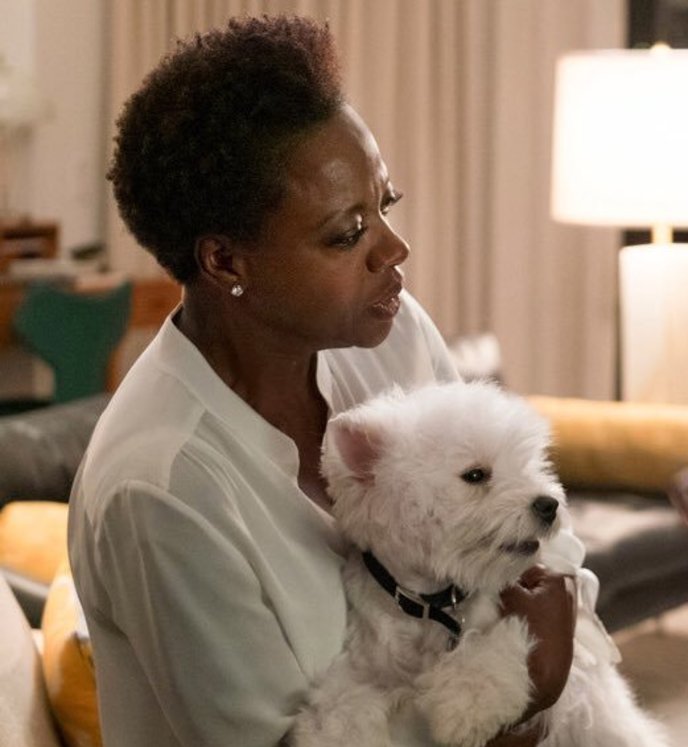There’s a moment, toward the end of “Widows,” right before the climactic heist, when we check in on the members of our titular crew before they don their black masks and holster their Glock .9mms. It’s that quintessential pre-heist montage of the players saying goodbye to their loved ones, just in case the job goes bad: Linda (Michelle Rodriguez) and Belle (Cynthia Erivo) kneel before an altar with Linda’s children, lighting candles to the Blessed Virgin. We’ve already seen Belle bid her daughter farewell, and Alice (Elizabeth Debicki) have one final drink with her kinda-sorta boyfriend/definite Sugar Daddy. So, the montage ends with Veronica Rawlings (Viola Davis) standing in front of a doggy daycare, preparing to drop off her beloved Westie terrier, Olivia (Olivia the dog, continuing the tail-wagging charm offensive from her debut in “Game Night”). Director Steve McQueen lingers on this moment far longer than the other farewells—he pulls his camera back wide, and in the dark of the evening, Veronica’s body becomes a knife-blade of a silhouette: She lifts Olivia up in her arms and holds her with a tenderness that is more poignant, for its openness, its earnestness.
This image of a hard-edged woman cradling her little dog, perhaps for the last time, is one of the rare pure moments of emotional unguardedness in a twisty film that is preoccupied with power: who has it, who wants it, and who gets to take it, against all odds. It’s also one of the few and precious instances I’ve ever seen, on-screen, where a woman’s relationship with her pet, especially her dog, is regarded with the emotional depth and intensity as her bond with child or spouse. Veronica is very much a woman alone, and angry about it—arguably, even before her husband is exploded off this mortal coil (or, at least, when he seems to have exploded off this mortal coil)—yet, her bond with Olivia isn’t a low blow of a portrayal, meant to show how sad and pathetic she is.
Olivia is her pampered, cherished, and oh-so-adorable companion; more than this, though, Olivia is Veronica’s connection to the parts of herself that long for love and connection—even though her life experience has taught her that love and connection can be the double edges of the sword that pierces her breast and lances her heart. Olivia is not just “the dog,” a fluffy entity for the audience to fret over, or a cuddly convenient way to thaw out an arctic woman and make her “more likeable”: “Widows” uses Olivia to tell a deeper, more nuanced story about loneliness and longing, a story that feels achingly familiar to people like me, who have turned to our pets to ameliorate both.

I am, to quote the kids in my neighborhood, “that dog lady.” I’ve lived alone for the better part of my adult life (since my mid-twenties), save for a German Shepherd named Tova (pictured above), who I adopted just after I finished grad school and started the I-guess-I’m-a-grown-up-so-what-now phase of my life, and, after Tova passed away, a wily Lab-mix named Mina, whose need for training helped me concentrate my grief. Tova was a gorgeous, martial-looking dog with a gorgeous, martial spirit. She was a pinnacle of her breed in solemn protectiveness—I remember how she dismissed one particularly tedious and callous beau of mine when he left my apartment for the last time; she stood with the length of her body pressed against my legs, blocking him from a final embrace, as if to say, “time’s up, cowboy”—but I cherished her, mostly (and among so many other things) as a constant presence, as silent and consistent as a pulse. She was my first “good morning” when I woke up; my last “good night,” every day.
In “Widows,” McQueen and Davis evoke this most powerful element of the human and canine bond, that quiet confidence that comes in sharing a space and performing the daily rituals of life, not through broadly emotive displays like the goodbye outside of doggy daycare (which is more impactful because it is so strategically deployed), but in treating Olivia as a fixture in Veronica’s life. Olivia is there, burrowed into Harry’s (Liam Neeson) side of the bed, when Veronica breaks down before Harry’s funeral, her meticulously-arranged face cracking, for just a moment, in an expression of raw grief. Olivia is there, nestled in her dog bed, as Veronica reads through Harry’s notebook of jobs, and begins to plot the job that will get her and her fellow widows out of debt. If the Rawlings’ penthouse magnifies and reflects Veronica’s loneliness and vulnerability—rendered in cool, distant colors that feel catalogue-ready; overlong corridors that seem to mock her sudden singledom with their dramatic excess of space; and broad-paneled windows that all but scream “go ahead and look inside, she’s all alone”—then Olivia is the affectionate, inquisitive figure of comfort who brings sloppy, puppy-kissing life into the void.
Veronica’s insistence on bringing Olivia nearly everywhere with her may seem, initially, like a defensive display of rich bitch posturing—but even this posturing is a form of well-sculpted emotional armor. I’m terrible with strangers, fumbling-tongued and desperately uncertain; talking about my dogs isn’t even a back-up, it’s often my first, second, and third plan of approach whenever I’m meeting someone new: Telling that story about how Tova almost won the pet costume contest, or how Mina came in top of her class at obedience school (not that I’m bragging), feels so much safer than offering something starker about myself, something that could be weaponized—but it doesn’t feel entirely like hiding, either, because these stories matter to me, as much as anything I’ve done in my career or any film I’ve ever loved. Being a devoted dog guardian means assuming a complex, multilayered identity—one that all the “Dog Mommy” merchandise tries to flatten into something both cutesy and sad.

Olivia doesn’t just allow Veronica to cosplay ladies who lunch (a pure-bred Westie puppy can cost upwards of 3,000 dollars, easily), which does, in and of itself, give this abrupt, awkward woman a role to play, a way to steady herself and stay focused and sane—she’s also a source of silent comfort, a ballast against the tenuousness of Veronica’s connection with the other women. It’s telling, for instance, that Veronica doesn’t bring Olivia with her when she rushes to Alice’s apartment after the Manning crime family murders Bash (Garret Dillahunt), the original getaway driver: Veronica is blisteringly open with Alice, releasing the full ugliness of her anger and her terror, sneering at the younger woman for taking a man into her bed when “your husband hasn’t even been dead a month,” slapping her and taking a hard slap in return, a slap that finally, mercifully, allows her to break down and cry. Alice is the most nakedly vulnerable of the widows—a battered bride, truly down and out, who thinks she has no smarts or skills to speak of—and it makes sense that Veronica, who must expend the constant energy of projecting an impenetrable guardedness, would feel some degree of subterranean interest in, even attraction to, her. The last scene in the entire film is Veronica, also sans dog, catching Alice outside of a bustling diner and slowly, genuinely, smiling at her, asking her how she’s been.
But this is not to suggest that Olivia is a mere mollifier, a puppy placeholder until Veronica can graduate into real relationships—indeed, the film demonstrates, with a diamond-sharp, blood-culling clarity, that Olivia is a far better companion than Harry was (Olivia would never start a secret second family, fake her own death, and try to abscond with Veronica’s hard-earned ill-gotten gains). Olivia functions as an extension of Veronica’s feelings, so attuned to her guardian’s moods that she’ll act on them before Veronica is even consciously aware of them—Olivia is the one who first sniffs Harry out, in hiding at his paramour’s home, clawing and whining at the door in way that evokes the grasping need and desperation of Veronica’s grief.
Some of that immediate grief is about Harry, of course; however, Veronica has been shaped by a deeper grief, the murder of her son at the hands of a trigger-happy Chicago cop. This death is so obliterating, that it isn’t even mentioned until it is shown, in full—it’s like some fanged, thunder-hooved deity whose name must not be spoken until it’s offered a blood sacrifice—and yet, McQueen, Davis, and screenwriter Gillian Flynn have already allowed it to echo through everything that we’ve seen before it, which yes, includes Veronica’s relationship with Olivia. We sense a wordless history: Harry gifting Veronica with an extensive puppy as a reason to get out of bed, to go outside, every day, until the routine starts to feel something like normalcy, until the dog can ease her calcified heart open, even a little. That puppy steadily becoming Veronica’s little sweetheart, her comfort, as Harry begins to pull away, emotionally, at first, and then toward the arms of a woman whose baby won’t be targeted by the bigots who still rule this world.

I’d never equate the loss of my Tova dog with the loss of a child, especially a child so cruelly taken. But I can say that her death devastated me, that my apartment became a whistling void. When I adopted Mina two weeks later, I willfully ignored her foster mom’s warning about how intensely she would “miss her people” when they left. That separation anxiety, manifest in clawing and scratching up the doors, the floors, the windowsills; howling in sorrow when I locked the door behind me; and drooling puddles everywhere, seemed to reflect the intractability of my own grief, a steady heartbeat gone frantic, erratic around one core need: Come back.
Like Veronica, although in my own, less grandiose way, I had to move through my pain, I had to have “the balls to pull this off”—only the “this” was no heist, simply training my unruly girl to calm down, to recognize that she was not abandoned and I would, in fact, come back. A training that, through its meticulous consistency, gave me a purpose, a reason to get out of bed each day, to go outside—until finally, I found a new normal, a new, and no less special, love, to greet with “good morning” and end the day with “good night.” Two years later, she’s my darling; that sweet, happy face in the window; that gentle heft climbing onto the sofa beside me. It’s a powerful, even transformative, thing, to see that kind of bond enacted without mockery or condescension—given dignity, in fact—by filmmakers who understand that the magnificent spectrum of human pain and tenderness has room for canine companionship.











